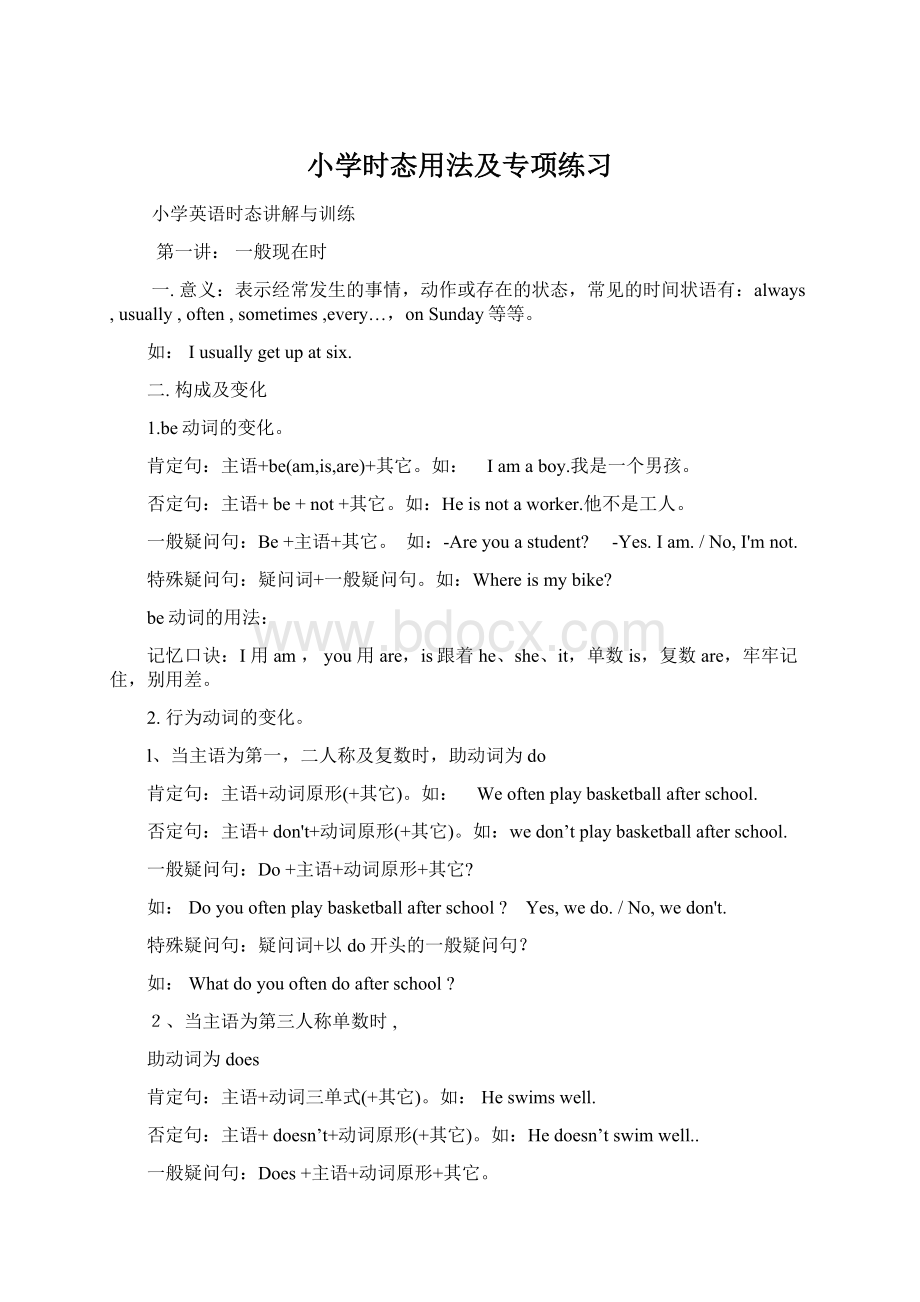小学时态用法及专项练习文档格式.docx
《小学时态用法及专项练习文档格式.docx》由会员分享,可在线阅读,更多相关《小学时态用法及专项练习文档格式.docx(11页珍藏版)》请在冰豆网上搜索。

主语+don'
t+动词原形(+其它)。
wedon’tplaybasketballafterschool.
Do+主语+动词原形+其它?
Doyouoftenplaybasketballafterschool?
Yes,wedo./No,wedon'
t.
疑问词+以do开头的一般疑问句?
Whatdoyouoftendoafterschool?
2、当主语为第三人称单数时,
助动词为does
主语+动词三单式(+其它)。
Heswimswell.
主语+doesn’t+动词原形(+其它)。
Hedoesn’tswimwell..
Does+主语+动词原形+其它。
Doesheswimwell?
Yes,hedoes./No,hedoesn'
疑问词+以does开头的一般疑问句?
Howdoesyourfathergotowork?
三.第三人称单数的动词变化规则(只有在第三人称为主语的肯定句中,动词才用三单式)
(1)多数动词直接加s:
runs gets likes collects takes plays climbs…….
(2)结尾是s,x,sh,ch,o,前为辅音字母,结尾加es:
watches teaches goes does washes crosses mixes brushes(3)动词末尾y前为辅音:
将y改为i加es:
study→studiesfly→fliescarry→carries
(二)课堂练习:
1、用am,is或are填空:
1)Where____________you?
I____________here.
2)Where____________it?
It____________here.
3)____________youLucyKing?
4)Myname____________Kate.
5)How____________Lily?
She____________fine.
6)____________youLiLei?
No,I____________LinTao.
7)This____________Jimandthis____________Sam.
8)Where____________JimandSam?
They____________overthere.
9)What____________it?
It____________abook.
10)What____________hisname?
Hisname____________LingFeng.
【同步练习】
一般现在时:
一、用括号内动词的适当形式填空。
1.Heoften(have)dinnerathome.
2.DanielandTommy(be)membersoftheReadingClub.
3.SheandI(take)awalktogethereveryevening.
4.There(be)somewaterinthebottle.
5.We(notwatch)TVonweekdays.
6.Nick(notdo)hishomeworkonSundays.
7.they(like)theWorldCup?
8.Whattheyusually(do)onholidays?
9.yourparents(read)newspaperseveryday?
10.Thegirl(teach)usEnglishonSundays.
二、按要求改写句子。
1.DanielwatchesTVeveryevening.(改为否定句)
DanielTVeveryevening.
2.Idomyhomeworkeveryday.(改为一般疑问句并作否定回答)
—youhomeworkeveryday?
—No,I.
3.Shelikesmilk.(改为一般疑问句并作肯定回答)
—shemilk?
—Yes,she.
4.SimonisfromBeijing.(同义句改写)
SimonBeijing.
5.MillieiscleveratMaths.(同义句改写)
MillieMaths.
三、单项选择。
()1.youhaveabook?
A.DoB.AreC.IsD.Have
()2.Theyonafarm.
A.workingB.isworkC.workD.isworked
()3.DoesPeterliketowatchTV?
.
A.Yes,helikeB.No,hedoesn’t
C.Yes,he’dlikeD.No,helikes
()4.Shedoesn’therhomeworkintheafternoon.
A.doingB.todoC.doesD.do
()5.HowMr.BrowntoAmerica?
A.do,goB.is,goC.does,goD.does,goes
()6.Where’smycamera?
Iit.
A.amnotfindingB.amnotseeing
C.can’tfindD.can’tlookat
()7.Howhegotowork?
Hetoworkbybike.
A.does,goB.do,goesC.do,goD.does,goes
()8.youusuallylateforschool?
No,.
A.Do,IamB.Does,not
C.Are,I’mnotD.Are,Iaren’t
()9.shehomeatsixeveryday?
A.Is,leaveB.Does,leaveC.Is,leavesD.Does,left
()10.Mr.YangEnglishthisterm.
A.teachesourB.teachesus
C.teachsusD.teachour
第二讲:
一般将来时
一、概念:
表示将要发生的动作及打算、计划或准备做某事。
句中一般有以下时间状语:
tomorrow,nextday(week,month,year…),soon,thedayaftertomorrow(后天)等。
二、基本结构:
①主语+begoingto+动词原形+其他;
②主语+will+动词原形+其他
三、否定句:
在be动词(am,is,are)后加not或情态动词will后加not成won'
t。
例如:
I'
mgoingtohaveapicnicthisafternoon.→I'
mnotgoingtohaveapicnicthisafternoon.
四、一般疑问句:
be或will提到句首,some改为any,and改为or,第一二人称互换。
例如:
Wearegoingtogofishingthisweekend.→Areyougoingtogofishingthisweekend?
五、对划线部分提问。
一般情况,一般将来时的对划线部分有三种情况。
1.问人。
Who例如:
mgoingtoNewYorksoon.→Who'
sgoingtoNewYorksoon?
2.问干什么。
What…do.例如:
Myfatherisgoingtowatcharacewithmethisafternoon.→Whatisyourfathergoingtodowithyouthisafternoon?
3.问什么时候。
When.例如:
She'
sgoingtogotobedatnine.
→Whenisshegoingtobed?
六、同义句:
begoingto=will
Iamgoingtogoswimmingtomorrow(明天).=Iwillgoswimmingtomorrow.
填空
1.我打算明天和朋友去野炊。
I_____________________haveapicnicwithmyfriends.
I________haveapicnicwithmyfriends.
2.下个星期一你打算去干嘛?
我想去打篮球。
What___________________________________________nextMonday?
I__________________playbasketball.
What_________youdonextMonday?
I________playbasketball.
3.你妈妈这个周末去购物吗?
是,她要去买一些水果。
_____yourmother_______________goshoppingthis___________?
Yes,she_________.She________________________buysomefruit.
4.你们打算什么时候见面。
Whattime_______you___________________meet?
改句子。
5.Nancyisgoingtogocamping.(改否定)
Nancy________goingtogocamping.
6.I'
mgoingtogetupat6:
30tomorrow.(改一般疑问句)
_______________________togetupat6:
30tomorrow?
7.Wewillmeetatthebusstopat10:
30.(改一般疑问句)
_______________meetatthebusstopat10:
30.
8.Sheisgoingtolistentomusicafterschool.(对划线部分提问)
_______________she_________________________afterschool?
10.Myfatherandmotheraregoingtoseeaplaythedayaftertomorrow.(同上)
__________________goingtoseeaplaythedayaftertomorrow.
用所给词的适当形式填空。
11.Todayisasunnyday.We___________________(have)apicnicthisafternoon.
12.Mybrother_______________(go)toShanghainextweek.
13.Tomoften______________(go)toschoolonfoot.Buttodayisrain.He______________(go)toschoolbybike.
14.Whatdoyouusuallydoatweekends?
Iusually__________(watch)TVand____________(catch)insects?
15.It'
sFridaytoday.What_____she_________(do)thisweekend?
She_____________(watch)
第三讲:
一般过去时
表示在过去某个时间里所发生的动作或存在的状态。
通常在句子里找到表示过去时间的词或词组。
yesterday,yesterdaymorning/evening,thedaybeforeyesterday(前天),lastnight/week/month/year,justnow(刚才),twodaysago,aweekago,in1990等。
Iwenttobedatelevenlastnight.昨晚我11:
00睡觉。
二、动词一般过去时变化规则
1.一般在动词末尾加-ed,如:
pull-pulled,cook-cooked,play-played
2.结尾是e加d,如:
taste-tasted
3.末尾只有一个元音字母和一个辅音字母的重读闭音节,应双写末尾的辅音字母,再加-ed,如:
stop-stopped,plan-planned,prefer-preferred
4.以“辅音字母+y”结尾的,变y为i,再加-ed,如:
study-studied
5.小学阶段不规则动词一般过去时:
am/is→wasare→werehave/has→haddo→did
sing→sangsit→satgive→gaverun→rancome→came eat→ate
take→took write→wroteride→rodedrive→drovespeak→spoke get→got
go→wentmake→madeknow→knewsee→sawteach→taughtbuy→boughtread→readput→puthurt→hurtcut→cutfall→fellsay→said
三、句式变化
(1)Be动词在一般过去时中的变化
①am和is在一般过去时中变为was。
(wasnot=wasn’t)
②are在一般过去时中变为were。
(werenot=weren’t)
③带有was或were的句子,其否定、疑问的变化和is,am,are一样,即否定句在was或were后加not,一般疑问句把was或were调到句首。
(2)句中没有be动词的一般过去时的句子
Jimdoeshomeworkeveryday.
Jimdidhomeworkyesterday.
Jimdidn'
tdohomeworkyesterday.(didn'
t+动词原形)
DidJimdohomeworkyesterday?
(在句首加did,句子中的动词过去式变回原形)
WhatdidJimdoyesterday?
(疑问词+一般疑问句?
)
一般过去式练习题:
一、写出下列动词的过去式或动词原形。
1.go_____2.is_____3.buy_____4.swim_____5.have______6.watched________7.ate_____8.got_____9.lived______10.saw_____11.spend_____12.talk______13.do_____14.teach_______15.win______16.like_______17.write_______18.cry______19.study_____20.ask_______
二、用单词的适当形式填空。
1.________you________(water)theflowersyesterday.
2.SuHai_________(go)forawalklastSunday.
3.Mikedidn’t________(finish)hishomeworkyesterday.
4.I_______(pick)applesonthetreelastmonth.
5.I_____(is)tenyearsoldlastyear.
6.There________(are)fivebooksonthedeskamomentago.
7.They________(sweep)thefloorjustnow.
8.I_________(meet)MissWhitethedaybeforeyesterday.
9.I_______(wash)clotheslastweekend.
10.Whatdidyouyoudoonyourholiday?
I________(go)swimming.
三、选择正确的答案。
1.I____presentsformyparentsyesterday.
A.buyedB.boughtC.buying
2.Susan_____swimmingyesterday.
A.goB.goesC.went
3.Danny_____breakfastfivetimeslastweek.
A.eatB.ateC.eated
4.LastSunday____TreePlantingDay.
A.isB.wereC.was
5.I____alotfromourtextbook.
A.learnedB.learnesC.learning
6.We____tothezooand___alotofanimalsyesterday.
A.go;
seeB.went;
sawC.goes;
sees
7.Whatdidyoudolastweekend?
--I_________
A.readabookB.washtheclothesC.gofishing
8.Whatdidyoudoonyourholiday?
I________
A.boughtapresentB.goskiingC.learnEnglish
9.Whatdidhe_____yesterday?
He____hishomework.
A.did;
didB.do;
didC.do;
do
10.YesterdaymypresentsandI____ourhouse.
A.werecleaningB.cleanedC.aregoingtoclean
11.What_____totreesinthedifferentseason?
A.happenB.happensC.happened
12.Lastsummer.I____inthelakeandplayedonthebeach.
A.swimB.swamC.willswim
13.DidyoueatgoodfoodinChina?
______.
A.Yes,IdoB.No,Ididn’tC.No,Idid
14.Weplayedbasketball_____.
A.sometimesB.onSaturdaysC.lastSaturday
第四讲:
现在进行时
1.用法:
①现在正在进行或发生的动作
例:
IamreadinganEnglishbooknow.我现在正在读一本英语书。
②当前一段时期内的活动或现阶段正在进行的动作
例:
TheyarelivinginBeijingthesedays.他们这些天一直住在北京。
2.与现在进行时连用的时间状语有:
now,thesedays,Look!
,Listen!
,Itis
seveno’clock.等的提示
3.现在进行时的构成:
be+现在分词
4.)现在进行时态的肯定式、否定式、疑问式及简略回答。
(1)肯定式:
be+v-ing
Sheissinginginthenextroom.
(2)否定式:
be+not+v-ing
Thestudentsaren’tcleaningtheroom.
(3)一般问句:
be动词提前。
肯定答语Yes,主语+be,否定